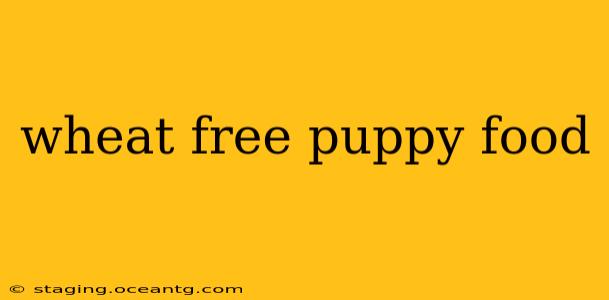Choosing the right puppy food is crucial for your furry friend's healthy growth and development. Many puppies suffer from wheat sensitivities or allergies, making a wheat-free diet essential for their well-being. This comprehensive guide explores the importance of wheat-free puppy food, its benefits, potential drawbacks, and how to choose the best option for your puppy.
Why Choose Wheat-Free Puppy Food?
Wheat is a common ingredient in many commercial dog foods, acting as a filler and binding agent. However, for some puppies, wheat can cause digestive upset, skin problems, and even more serious allergic reactions. Symptoms can range from mild itching and diarrhea to vomiting, lethargy, and chronic ear infections. A wheat-free diet eliminates this potential allergen, allowing your puppy to thrive without the discomfort and health issues associated with wheat sensitivity.
What are the benefits of a wheat-free diet for puppies?
- Improved Digestion: Wheat can be difficult for some puppies to digest, leading to gas, bloating, and diarrhea. A wheat-free diet often results in improved digestion and firmer stools.
- Healthier Skin and Coat: Wheat allergies can manifest as itchy skin, dry coat, and recurring skin infections. Removing wheat from your puppy's diet can lead to significant improvements in skin and coat health.
- Increased Energy Levels: Digestive issues caused by wheat can lead to lethargy and reduced energy levels. A wheat-free diet can often boost your puppy's energy and playfulness.
- Reduced Allergy Symptoms: For puppies with wheat allergies, eliminating wheat is crucial to alleviate symptoms and improve overall health.
What to Look for in Wheat-Free Puppy Food
Selecting the right wheat-free puppy food requires careful consideration. Here's what to look for:
- High-Quality Protein Sources: Look for foods that list named meat sources (e.g., chicken, beef, lamb) as the primary ingredients, not just "meat by-products."
- Healthy Fats: Essential fatty acids are crucial for skin and coat health. Look for sources like salmon oil or flaxseed oil.
- Avoid Fillers: While wheat is a common filler, others exist. Opt for foods with minimal fillers and a focus on whole, recognizable ingredients.
- Age-Appropriate Nutrition: Puppy food is formulated to meet the specific nutritional needs of growing puppies. Choose a food specifically labeled for puppies.
- Veterinarian Recommendation: Always consult your veterinarian before making significant dietary changes, especially for puppies with known allergies or sensitivities. They can help you determine the best course of action and recommend suitable food options.
What are some common ingredients to avoid besides wheat?
Many puppies also exhibit sensitivities to corn, soy, and dairy. Checking labels carefully and choosing foods that avoid these ingredients can further reduce the risk of allergic reactions. Look for options that clearly state "grain-free" or specify the protein and carbohydrate sources.
How do I know if my puppy is allergic to wheat?
If your puppy exhibits symptoms like persistent itching, diarrhea, vomiting, or skin problems, consult your veterinarian. They can perform allergy testing to pinpoint the exact cause and recommend a suitable diet. Eliminating potential allergens like wheat through a trial-and-error process (under veterinary guidance) can help identify food sensitivities.
Are there any potential drawbacks to wheat-free puppy food?
While generally beneficial, some wheat-free foods might be more expensive than those containing wheat. Additionally, ensure the chosen food provides complete and balanced nutrition, as some formulations may lack specific nutrients if not properly formulated. Always check the AAFCO statement on the label to ensure it meets nutritional requirements.
Can I make my own wheat-free puppy food?
While homemade diets can be appealing, it's crucial to ensure they meet all your puppy's nutritional needs. Consulting a veterinary nutritionist is vital to create a balanced and safe homemade diet for your puppy. Improperly balanced homemade diets can lead to nutritional deficiencies.
Choosing the right wheat-free puppy food is a crucial step in ensuring your puppy's health and happiness. By carefully considering the ingredients, consulting your veterinarian, and understanding your puppy's individual needs, you can provide your furry friend with the optimal nutrition for healthy growth and development. Remember that a healthy diet is just one piece of the puzzle; regular exercise and veterinary check-ups are also vital for your puppy's well-being.
